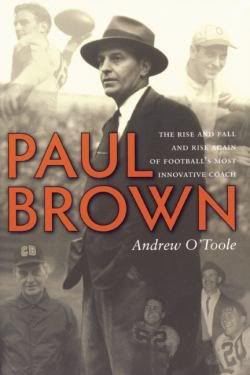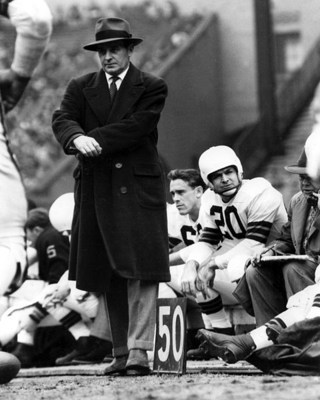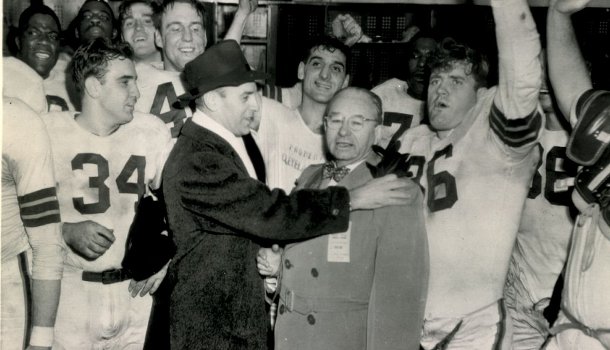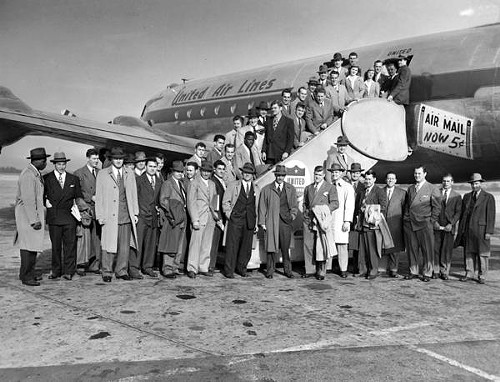 Browns Archive
Browns Archive  Blast From The Past: Paul Brown
Blast From The Past: Paul Brown
 Like me, you may be too young to have watched the Cleveland Browns during the Paul Brown years. Your understanding of the man may resemble that which I have held. Ohio boy; brilliant coach; began sharpening his legendary coaching techniques and skills as the high school head football coach at Massillon. Eventually coached the Ohio State Buckeyes; stepped up to professional football and led the Cleveland Browns to several championships; was forced out as the Browns' coach in the early 1960s during a less successful era by owner Art Modell amid some turmoil between Brown and players such as Jim Brown. Was seen by many as a man whom football had passed by. Resurfaced as the owner and coach of the expansion Cincinnati Bengals, and oversaw their initial rise to prominence.
Like me, you may be too young to have watched the Cleveland Browns during the Paul Brown years. Your understanding of the man may resemble that which I have held. Ohio boy; brilliant coach; began sharpening his legendary coaching techniques and skills as the high school head football coach at Massillon. Eventually coached the Ohio State Buckeyes; stepped up to professional football and led the Cleveland Browns to several championships; was forced out as the Browns' coach in the early 1960s during a less successful era by owner Art Modell amid some turmoil between Brown and players such as Jim Brown. Was seen by many as a man whom football had passed by. Resurfaced as the owner and coach of the expansion Cincinnati Bengals, and oversaw their initial rise to prominence.
Then there's the litany of innovations which PB pioneered. He turned football into a science, and many Browns fans can dutifully recite: he invented the facemask and the playbook. He was the first coach to call plays from the sidelines and was the first to try radios in the quarterback's helmet. He was the inventor of the draw play and the zone pass defense. He established the concept of the practice squad, known then as the "taxi squad" because he arranged for those players to be employed by then-owner Mickey McBride's cab company. He created the concept of sports booster clubs. He was the first to use practice and game films, classroom techniques, the forty-yard dash, and IQ tests as coaching tools. He invented the concept of ‘position coaches.'
 But I'd also realized there was a lot about Paul Brown I did not know. I had heard first-hand accounts of what a solid gentleman he was, yet professional enemies littered his past. He was a man of principle, a strong adherent to closely-held ideals. I also was aware that PB had been a central figure in the racial integration of professional sports during the time of the Jackie Robinson era in baseball. I'd held other preconceived assumptions about the life and times of Paul Brown- some of which were on target and some of which apparently were not.
But I'd also realized there was a lot about Paul Brown I did not know. I had heard first-hand accounts of what a solid gentleman he was, yet professional enemies littered his past. He was a man of principle, a strong adherent to closely-held ideals. I also was aware that PB had been a central figure in the racial integration of professional sports during the time of the Jackie Robinson era in baseball. I'd held other preconceived assumptions about the life and times of Paul Brown- some of which were on target and some of which apparently were not.
I recently re-read Paul Brown: The Rise and Fall and Rise Again of Football's Most Innovative Coach, a 440-page book by author Andrew O'Toole which is now out in paperback ($24.00 hardback; $16.95 paperback, Clerisy Press). The book filled a lot of the holes in my understanding of the life and career of the coach. Unsurprisingly, it also created more questions in my mind about the complex, driven coach who is a pillar of the most popular sport in our culture today.
I was fortunate enough to have a conversation with Mr. O'Toole by phone about the book. We covered various topics, which I am summarizing below. Mr. O'Toole's replies shown here are largely paraphrased- augmented with information from the book.
________________________________________________________________________
Me: The story of Paul Brown signing Bill Willis and Marion Motley to the Cleveland Browns is not really in the public consciousness. I've heard that your book is the first to look at the coach's role in the integration of football. Your thoughts on that?
Andrew O'Toole: I think Paul Brown is very comparable to baseball pioneer Branch Rickey with regards to racial integration. They both were signing black players to professional contracts by 1946. But there was a distinct difference between the two. Although his heart was in the right place, Rickey never got tired of patting himself on the back. I've been asked: did Paul Brown have an interest in civil rights? Well, to him, race just didn't matter. He didn't address it- just never brought up the subject. He only wanted to win football games.
The Dodgers were much like the Browns into the 1950s. Those teams didn't have just one or two black players; they had several- more than any other team in their leagues.
The early Cleveland Browns teams had instant support from the local black-run newspaper, and were embraced early on by the black community. To this day, many older black men around the country are fans of the Browns from those early days.
Now, with Jim Brown, he was a different personality. He was well ahead of his time on the field, but also off the field, where he had strong opinions. He was comfortable speaking about them publicly. His outspoken nature paved the way for guys like Bill Russell, and the Jackie Robinson of later years. Jim Brown actually paved the way for the media giant that Muhammad Ali became as well. Paul Brown was not interested in players' contrary opinions. I truly don't think it was a racial thing between Jim and Paul, but Jim Brown represented a problem for the coach due to his insistence that his thoughts as a player mattered.
GP: It is still surprising to me that the control freak, Paul Brown, found himself to be in the position of losing in a power play to Art Modell. Especially after he had been taken by surprise when Mickey McBride sold the team years earlier.
AO: Yes. Although Paul didn't help himself there. He had been openly rude to each of those men, eg. from when he tersely ordered them out of ‘his' locker room at various times. McBride's sale of the Browns (in 1953) was consummated while the coach was on a fishing trip in Canada. The timing was intentional; it showed Paul who was boss.
Paul was especially hurt upon seeing how, when Art fired him, the coaches and front office staff did not protest or otherwise stay loyal to him.
GP: It seems to me that Paul Brown made things harder on himself than he needed to, by his stubbornness, pettiness, and the us-against-them side of his personality. He made enemies that it didn't seem like he needed to make. And his double standard made it OK for him to do some things that he considered unforgivable from others.
I found it fascinating that when Brown left Ohio State in 1944 (requesting that he not be granted draft deferment and thus finding himself coach at the Great Lakes Naval Center, just north of Chicago), he left them in the hands of assistant Carroll Widdoes. Then, when Brown's Navy team played and lost to Widdoes' Buckeyes, Brown was incensed, as if he had been betrayed. Before he left the field, Brown poked his finger at Widdoes and told him he'd get back at him. What was Widdoes supposed to do?
AO: If you crossed Paul, you were done. Forgiveness for a perceived lack of loyalty did not seem to be an option. Getting into what really made Paul Brown tick is very elusive.
GP: Ohio State was always Brown's dream job. However, legendary Buckeye athletic director Lynn St. John was not at all in Paul's corner back when he was released from the military. Can you talk about that?
AO: They were just 2 huge egos- St. John didn't want Brown back. The newspapers of the times did not dig into the rift. Also, although there were several letters sent between the two men, none of them survived.
GP: So from the military, Paul joined what was to become the Cleveland Browns. He began signing returning military men who still had eligibility remaining at Ohio State. This was a no-no when he had been a college coach, but he rationalized it: the war veterans were now men; circumstances were different. Widdoes didn't like it, of course, but loyalty often went one way with Paul.
AO: Blanton Collier was a very interesting case, too- you know, Paul Brown always surrounded himself with top-notch assistants. Collier was a true innovator and deserves some of the credit Paul gets for the Cleveland Browns offense. Also, with film study. He was Paul's right-hand man all through the pro championships. And then he of course won the 1964 NFL championship. Paul's and Blanton's families were very close- they took vacations together every year, spent holidays together...
Well, when Art Modell fired Paul, and asked Collier to be the head coach, Blanton went to Paul for his counsel. Paul quietly told him he should take the position. They both knew that it necessarily meant their families' and their friendship were over.
GP: Back in 1951, the Cleveland Browns were so accustomed to championships that it was almost a non-story. In your book, you note that due to attendance levels in Cleveland - even after joining the NFL - Paul Brown wondered if pro football would ever really work there. This is really surprising to me. He wanted to go back to the college game; he really preferred Ohio State, but let it be known that he'd be willing to speak with USC (Minnesota and Stanford were known to be interested in him as well).
 AO: Yes, well, the NFL is so big now. But back then- going back to the late 1940s when Paul was starting his run of championships- baseball was king, and even boxing was bigger than football. The Browns were profitable, but there were really only a few really strong pro football cities: New York, Chicago, Philadelphia, Washington...
AO: Yes, well, the NFL is so big now. But back then- going back to the late 1940s when Paul was starting his run of championships- baseball was king, and even boxing was bigger than football. The Browns were profitable, but there were really only a few really strong pro football cities: New York, Chicago, Philadelphia, Washington...
Also going on were the Kefauver hearings on organized crime, led by Senator Estes Kefauver from Tennessee (this was the first time the Mafia entered the consciousness of mainstream America). Mickey McBride (photo) was called to testify in those hearings in 1951, and at the time, there were whispers suggesting he might be implicated in criminal activity (ultimately, he would not be).
During this time, Ohio State was split on who they wanted to hire. The alumni and the high school coaches in Ohio were solidly behind Paul Brown. Paul implied he had interest when he visited the school.
He did not get the job. Paul then spun it as though he never really campaigned for it.
The winner was the former Miami University coach, Woody Hayes.
______________________________________________________________
I endorse this book- for me, it was a great read and continues to be a handy reference. Basically, if you think you or someone you know will like it, you'll be right.
Thank you for reading.
Paul Brown with the team on its first airplane flight. His Browns would soon become the first football team to fly to all away games.

- NBA Announces 2013-2014 Schedule
- Browns Ink Sharknado
- Sharknado A No-Show For Rookie Camp
- Trent Richardson Out Until Training Camp
- Browns Sign Brandon Jackson
- Carrasco Suspended Eight Games
- Browns Add to Wide Receiver Depth with David Nelson
- Browns Need to Learn from Past Draft Mistakes
- Browns Release Chris Gocong and Usama Young
- Browns Missing on Grimes Disappointing, But Not The End
The TCF Forums
- Official- Browns Coach Search/Rumors
mattvan1 (Tuesday, January 21 2014 1:19 PM) - Movies coming out
rebelwithoutaclue (Tuesday, January 21 2014 12:56 PM) - 2015 Recruiting
jclvd_23 (Tuesday, January 21 2014 12:38 PM) - The 2014 Offseason Thread
Larvell Blanks (Tuesday, January 21 2014 12:25 PM) - Chris Grant's first 3 drafts
Kingpin74 (Tuesday, January 21 2014 10:13 AM) - Mike Brown
YahooFanChicago (Monday, January 20 2014 11:15 PM) - 2014 Hoops Hockey Hijinx
jpd1224 (Monday, January 20 2014 4:44 PM) - 2014 Recruiting
jclvd_23 (Monday, January 20 2014 2:26 PM) - Wish List - #4 Pick
Hikohadon (Monday, January 20 2014 1:26 PM) - #1 overall pick Anthony Bennett
TouchEmAllTime (Sunday, January 19 2014 1:28 PM)



